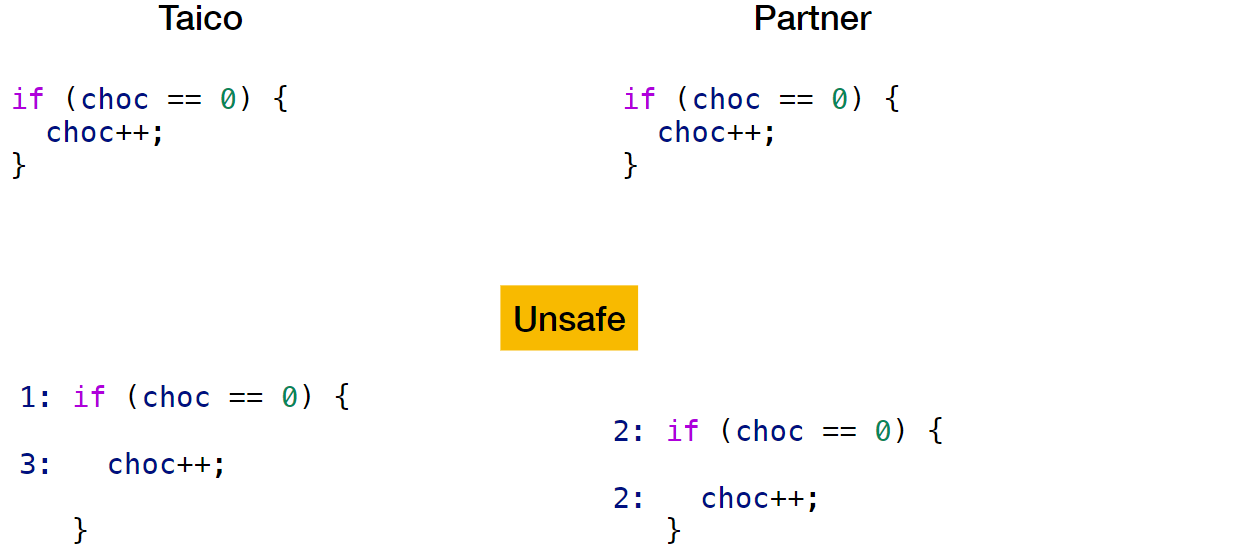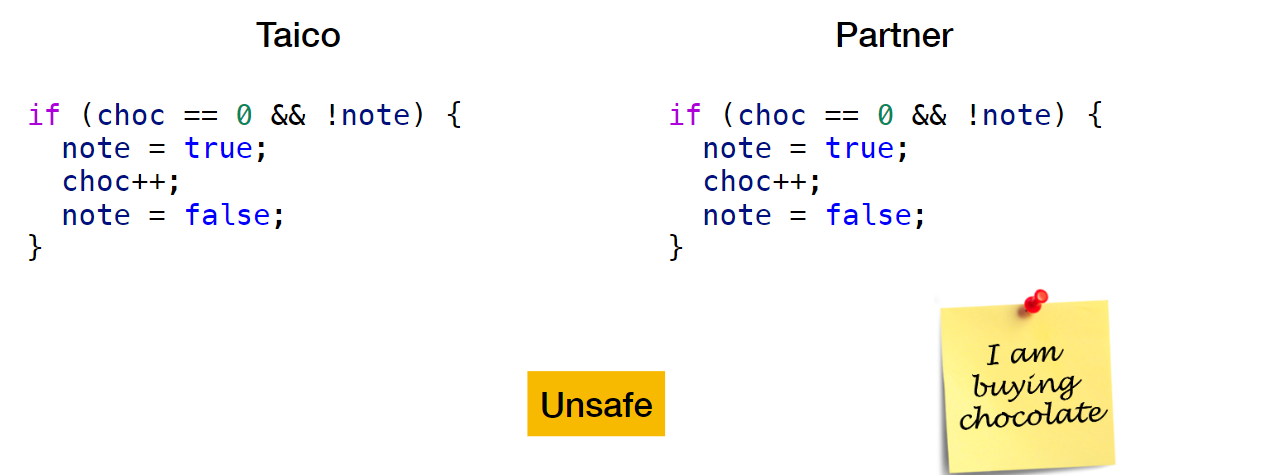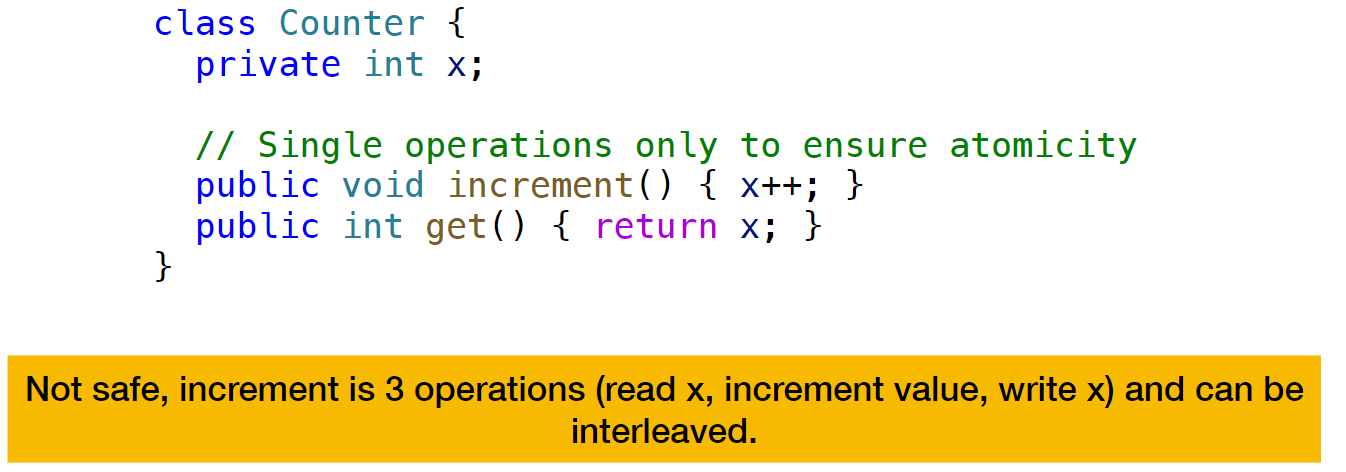목차
Learning Objectives
• Explain what concurrency and parallel computing are
• Explain how we can fake parallelism on a single executor
• Explain what atomicity is and how it is important for concurrent code
• Explain what critical sections are and different ways in which you can protect them against concurrent use
• Explain the potential problems with concurrent execution and how to prevent them
• Write safe concurrent programs for parallel execution
• Explain what futures and promises are, and how async/await notation makes their use convenient
• Explain how (software) transactional memory works
Concurrency (동시 실행)
Concurrency is the ability of different parts or units of a program to be executed out-of-order or in partial order, without affecting the outcome. This allows for parallel execution of the concurrent units.
→ Code blocks are independent of each other, even if they are executed in different order, the outcome has to be same.
Parallel Computing
Parallel computing is a type of computation in which many calculations or processes are carried out simulataneously.
Concurrency - Thread
Independently schedulable entity
Allows you to run code concurrently

Does this mean that threads run in parallel? --> allows to do out-of-order execution but doesn't guarantee that they are being executed at the same time
Concurrency - Faking parallelism
Do a little bit of task, then switch to a different one (빨리 바꾸면 in millisec, looks like in parallel)
Rinse and repeat: looks like parallel but is not actually doing things in parallel
Concurrency - Preemption
Interrupt a task and switch to a different one
How to switch? → interrupt mechanism in hardware
Cost of "Save the value I was at" (saving state)
Cost of "Where was I?" (restoring state)
→ Expensive
Concurrent Algorithms
Not everything can be done in parallel (depends on computer's hardware) 그래서 making it concurrent
Divide-and-conquer algorithms are usually easier to parallelize
Amdahl's law: number of processors does not increase the speedup all the time (saturation)
Concurrency Problems
Safety
Concurrent code is more prone to errors
- Does it work for all possible orderings of operations?
Race Condition
Outcome depends on the sequence or timing of individual instructions e.g. Queue 동시에 받기
Deadlock
Heisenbugs
The act of observing a system alters its state
Example:
class ParallelTest1 {
public static void main(String[] args) throws Exception {
Counter c = new Counter();
Thread t1 = new Thread(() -> {
for (int i = 0; i < 300; i++) {
c.increment();
}
});
Thread t2 = new Thread(() -> {
for (int i = 0; i < 300; i++) {
c.increment();
}
});
t1.start();
t2.start();
// Wait for both to be done
t1.join();
t2.join();
// Print the final result
System.out.println(c.get());
}
}
class Counter {
private int x;
// Single operations only to ensure atomicity
public void increment() { x++; }
public int get() { return x; }
}
I'm starting the first thread before the second thread so there is a bit of time so it can count 30 times (no problem), but for 300 or 3000, it does not give 600 or 6000.
class ParallelTest1 {
public static void main(String[] args) throws Exception {
Counter c = new Counter();
Thread t1 = new Thread(() -> {
for (int i = 0; i < 300; i++) {
System.out.println("" + i);
c.increment();
}
});
Thread t2 = new Thread(() -> {
for (int i = 0; i < 300; i++) {
System.out.println("" + i);
c.increment();
}
});
t1.start();
t2.start();
// Wait for both to be done
t1.join();
t2.join();
// Print the final result
System.out.println(c.get());
}
}
class Counter {
private int x;
// Single operations only to ensure atomicity
public void increment() { x++; }
public int get() { return x; }
}
For-loop에 print statement 추가하면 600이나 6000 출력. (Observing the system alters its state)
x++ =
x = x+1
1. Read x
2. Increment value on stack
3. Write into x
So 3 operations
After reading x in step 1, in between step 1 and 2, the other thread can perform the operation (so we skipped one increment count). 그래서 600이나 6000 count 아님.

So we need to care about atomicity of actions (so the actions happen before and after, not during).
Concurrency Problems - Fairness
Many implementations are unfair
- Accidentally or intentional
- Unfair solutions are usually faster (less to do)
Starvation possible (one or multiple threads never execute)
Not Enough Chocolate
Goal:
- If there is no chocolate, someone buys it
- Only one person buys chocolate at a time
- We don't end up with multiple chocolates
Solution 1:

Solution 2: Communicate using notes


Solution 3


What we need is a way to prevent interleaved operations
- Critical section (only one code can enter the section, and no other code can)
- Do more things in one step: atomic read-modify-write operations
Concurrency Solutions
Critical Sections
Region that can be entered by only one thread at a time
Region that should be entered by only one thread at a time
Locks
E.g. Critical section in Java with Synchronized
Synchronized keyword:
- Allows only one thread to enter that method/block
- Guarded on a particular object

class SynchronizedExample1 {
public static void main(String[] args) throws Exception {
Object obj = new Object();
new Thread(() -> doStuff(obj), "T1").start();
new Thread(() -> doStuff(obj), "T2").start();
// Is T1 always first?
}
public static void doStuff(Object obj) {
System.out.println("Thread " + Thread.currentThread().getName() + " before critical section");
synchronized (obj) {
System.out.println("Thread " + Thread.currentThread().getName() + " entered critical section");
Util.doLongCalculation(10000);
System.out.println("Thread " + Thread.currentThread().getName() + " leaving critical section");
}
System.out.println("Thread " + Thread.currentThread().getName() + " left critical section");
}
}
이렇게 하면:
Thread T1 before critical section
Thread T1 entered critical section
Thread T2 before critical section
Thread T1 leaving critical section
Thread T1 left critical section
Thread T2 entered critical section
마찬가지로 Counter의 increment함수도 synchroinzed로 바꾸면:
Return 6000 because only one thread can increment at the same time
Example: Critical Section in Java using Locks
Locks class
Instead of synchronized, you can also use locks

import java.util.concurrent.locks.Lock;
import java.util.concurrent.locks.ReentrantLock;
class LocksExample1 {
public static void main(String[] args) {
MyObject m = new MyObject();
new Thread(() -> m.doStuff(), "T1").start();
new Thread(() -> m.doOtherStuff(), "T2").start();
}
}
class MyObject {
private Lock lock = new ReentrantLock();
public void doStuff() {
System.out.println("Thread " + Thread.currentThread().getName() + " in doStuff, before lock");
lock.lock();
System.out.println("Thread " + Thread.currentThread().getName() + " in doStuff, after lock");
Util.doLongCalculation(10000);
System.out.println("Thread " + Thread.currentThread().getName() + " in doStuff, before unlock");
lock.unlock();
System.out.println("Thread " + Thread.currentThread().getName() + " in doStuff, after unlock");
}
public void doOtherStuff() {
System.out.println("Thread " + Thread.currentThread().getName() + " in doOtherStuff, before lock");
lock.lock();
System.out.println("Thread " + Thread.currentThread().getName() + " in doOtherStuff, after lock");
Util.doLongCalculation(10000);
System.out.println("Thread " + Thread.currentThread().getName() + " in doOtherStuff, before unlock");
lock.unlock();
System.out.println("Thread " + Thread.currentThread().getName() + " in doOtherStuff, after unlock");
}
}
Thread T1 in doStuff, before lock
Thread T1 in doStuff, after lock
Thread T2 in doOtherStuff, before lock
Thread T1 in doStuff, before unlock
Thread T1 in doStuff, after unlock
Thread T2 in doOtherStuff, after lock
...
Nothing is safe so T2 may occur first
Issues of locking
Performance
Fairness:
- Thread who gets to go next is random
- Fair lock is possible, but often slower
Deadlocks
public class Deadlock {
private static Lock lockA = new ReentrantLock();
private static Lock lockB = new ReentrantLock();
private static int balanceA = 1_000_000;
private static int balanceB = 1_000_000;
/**
* Showcases race condition for parallel non-atomic read/write of balances.
* Using locks showcases a deadlock.
* Show how print frequency affects how long it takes until deadlock.
* Show how order of which lock is locked first affects whether deadlock occurs or not.
*/
public static void main(String[] args) throws Exception {
// Thread to transfer 100,000 euro from A to B, 1 euro at a time.
Thread aToB = new Thread(() -> {
for (int i = 0; i < 100_000; i++) {
transferAtoB_noLock(1);
// transferAtoB_withLock(1);
// if (i % 10 == 0) System.out.println("Transferred " + i + " from A to B");
}
});
// Thread to transfer 100,000 euro from B to A, 1 euro at a time.
Thread bToA = new Thread(() -> {
for (int i = 0; i < 100_000; i++) {
transferBtoA_noLock(1);
// transferBtoA_withLock(1);
// if (i % 10 == 0) System.out.println("Transferred " + i + " from B to A");
}
});
// Start transferring money
aToB.start();
bToA.start();
// Wait for both to finish
aToB.join();
bToA.join();
// Report how much money each has.
reportMoney();
}
public static void reportMoney() {
System.out.println("Balance A: " + balanceA);
System.out.println("Balance B: " + balanceB);
}
/**
* Transfer the given amount of money from A to B, without locking.
*/
public static void transferAtoB_noLock(int amount) {
balanceA = balanceA - amount;
balanceB = balanceB + amount;
}
/**
* Transfer the given amount of money from B to A, without locking.
*/
public static void transferBtoA_noLock(int amount) {
balanceB = balanceB - amount;
balanceA = balanceA + amount;
}
/**
* Transfer the given amount of money from A to B.
*/
public static void transferAtoB_withLock(int amount) {
lockA.lock();
try {
lockB.lock();
try {
balanceA = balanceA - amount;
balanceB = balanceB + amount;
} finally {
lockB.unlock();
}
// Do stuff
} finally {
lockA.unlock();
}
}
/**
* Transfer the given amount of money from A to B.
*/
public static void transferBtoA_withLock(int amount) {
lockB.lock();
try {
lockA.lock();
try {
balanceB = balanceB - amount;
balanceA = balanceA + amount;
} finally {
lockA.unlock();
}
} finally {
lockB.unlock();
}
}
}
Bank
Unlock 쓰면 100000 아님
Lock 썼는데 Deadlock
A first locks A then B, and B first locks B then A.
A lock, B lock, try to lock B -> waits, try to lock A -> waits so they are waiting forever
if we lock in the same order, no interleaving problems
Atomicity
All or nothing
To implement "All or nothing" operations: Hardware support needed (we don't do stuff interleaved)
Atomic Read-Modify-Write Operations
Explicit CPU support
Compare-and-Swap (CAS)

Example: Java AtomicInteger
How is AtomicInteger implemented?
General approach:
- Use CAS in a while loop until successful
- Very short window for concurrent issues, so usually succeeds first try
Lockless way to do a concurrent counter
How to make your life easier?
Do lockless if possible
If lock necessary, lock for as short as possible
Amound and frequency of concurrent access influences best solution, check what your scenario is
Don't reinvent the wheel, use existing solutions suited to your scenario
Don't use side effects
Use pure functions wherever possible
AtomicIntever vs Locks
AtomicInteger is an integer variable that can be concurrently used
AtomicInteger is more specialized
AtomicInteger is more performant for its usage
You can create locks with an atomic integer (or boolean, long, float, etc)
You can create (less performant) atomic integers with locks
AtomicInteger knows "lock time" is generally short
Locks know nothing about how long the "lock time" will be
AtomicInteger: is the value that we expected it to be? If so, update. If not, try again.
Concurrency Solutions have Problems
Example 1:

Example 2:

Example 3:

Since we never catch them, the lock will never be unlocked.
→ List can also throw exceptions.
To fix it: Try and catch, Try and finally block (finally block: whatever it happens, unlock the lock) → safe for concurrent use
Example 4:

Concurrent safe because we don't do any structural modification of the ArrayList, such as adding or removing elements.
Software Transactional Memory
Database Transactions: Many reading
ACID
What is the problem?
Concurrently mutating causes all of our issues
Idea: Restrict writes (and reads) of variables that are used concurrently
Rust: only 1 thread (1 owner) can have a writable view of variable (ownership), and if there is a writable view, no others can read
STM: Force read/write of transactional variables to be in transactions
Example:
import scala.concurrent.stm._
object STMExample1 {
def main(args: Array[String]) = {
// In one thread, transfer money from x to y (after a delay of 0.5 sec)
new Thread(() => {
Thread.sleep(500)
transfer(2)
}).start()
// In another thread, read x and y (with a delay of 1 sec between them)
new Thread(() => {
sum()
}).start()
// Wait until both have finished
Thread.sleep(3000)
println("Money: x=" + x.single() + ", y=" + y.single())
}
val (x, y) = (Ref(10), Ref(0))
def sum() = {
println("Starting sum")
atomic { implicit transaction =>
println("Reading x")
val a = x()
Thread.sleep(1000)
println("Reading y")
val b = y()
a + b
}
}
def transfer(n: Int) = {
println("Transferring " + n + " from x to y")
atomic { implicit transaction =>
x -= n
y += n
}
println("Finished transferring money!")
}
}
delay:
Start by not doing anything
Sum starts; Read x and wait
Then transfer interleaved
What the transactions do: Automatically detecting this conflict from happening and automatically fixing it
→ Always report the correct sum
Transactions
A transaction is applied in full, or (in case of conflict) not applied at all
Transactions can be safely retried
→ Transactions must not have side-effects outside of what is retryable (side effect actions such as printing)
Side-effects
Transactions should only contain:
- STM actions
- Reversible/non-side-effecting operations
Only once a transaction is committed can you rely on anything that happened inside the transaction block
Dealing with inconsistencies
STM detects inconsistencies and automatically retries

It keeps track of everything you read up until the point where the transaction was and if it detects someone was writing to x while I wasn't looking, then rollback
Retry Operation
When a transaction calls retry (e.g. condition does not hold), it would be wasteful to immediately check again
Instead, STM waits until a field the transaction read is changed
It automatically detects which fields were read
Composing Transactions
With orAtomic multiple actions can be composed
atomic {A} orAtomic{B}
If A retries, then attempt B
If B also retries, wait for variables read by A or B to change
Once a change is detected, rerun the corresponding action
How to implement?
Usually optimistic approach (lock-free)
Assume it will go well, check at end if that was the correct assumption
E.g.
- keep a global version
- keep version for each variable (last time read/written)
- when reading/writing, if version of variable is greater than version at the start of transaction → abort
Advantages/Disadvantages
Advantages:
- No deadlocks
- No race conditions
- Simple to use (isolation → composable)
- Easy to understand code
Disadvantages:
- More overhead when not using a lot of threads
Future & Promises
Abstraction for asynchronous computation
Proxy (대리) for something that is not yet done/known
→ Result will appear in future eventually
Usually used in combination with a ThreadPool

class FutureExample {
private static ExecutorService executor = Executors.newFixedThreadPool(2);
public static Future<Integer> calculate(int input) {
System.out.println("Starting calculation");
return executor.submit(() -> {
// Simulate a long calculation
Util.doLongCalculation(10000);
return input * input;
});
}
public static void main(String[] args) throws Exception {
Future<Integer> f = calculate(5);
System.out.println("Submission of task is done, but we are still executing");
System.out.println("Result: " + f.); // will block waiting for the result
}
}
Starting calculation
Is the task already done? false
Submission of task is done, but we are still executing
In theory we could do something else at this point
Async/Await
Language support for promises/futures → Javascript, C#, Rust
Shared Thread Pool (or even just a single executor)
Async functions wrap their results in promises/futures
Awaiting a promise/future actually gets the result
async function f2() {
var a = await sleep(5000);
return a;
}
// console.log(f2());
f2().then(console.log);
// TODO Show in browser with proper fetch support and awaiting at top level
const address = fetch("https://jsonplaceholder.typicode.com/users/1")
.then((response) => response.json())
.then((user) => {
return user.address;
});
address.then(console.log);
console.log("Main thread exits");
// const printAddress = () => {
// address.then((a) => {
// console.log(a);
// });
// };
// printAddress();
'학교 > CPL' 카테고리의 다른 글
| CPL 5: Parallel and Concurrent (0) | 2024.04.09 |
|---|---|
| Lecture 11: Type Checking (1) | 2024.04.06 |
| CPL 4: Mutation and State (0) | 2024.04.05 |
| Lecture 7-8: Mutation and State (0) | 2024.04.01 |
| CPL 3: Function Interpretation and Environments (0) | 2024.03.31 |




댓글